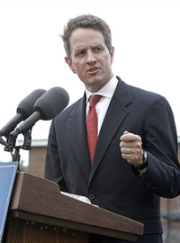Now much too big to fail
Courtesy of Tim Iacono at The Mess That Greenspan Made
A report by David Cho in today’s Washington Post tells of the great advances now being made in restoring the banking sector and financial markets to their pre-2008 glory.
Banks ‘Too Big to Fail’ Have Grown Even Bigger
When the credit crisis struck last year, federal regulators pumped tens of billions of dollars into the nation’s leading financial institutions because the
Today, the biggest of those banks are even bigger.
 The crisis may be turning out very well for many of the behemoths that dominate U.S. finance. A series of federally arranged mergers safely landed troubled banks on the decks of more stable firms. And it allowed the survivors to emerge from the turmoil with strengthened market positions, giving them even greater control over consumer lending and more potential to profit.
The crisis may be turning out very well for many of the behemoths that dominate U.S. finance. A series of federally arranged mergers safely landed troubled banks on the decks of more stable firms. And it allowed the survivors to emerge from the turmoil with strengthened market positions, giving them even greater control over consumer lending and more potential to profit.
J.P. Morgan Chase, an amalgam of some of Wall
Now that’s a sweet deal – boost your market share in originating what are essentially "no-risk" loans because, either wards of the state Fannie Mae and FreddieMac will buy the loans or you’ll get bailed out if things again go awry.
If you’re a big bank, what’s not to like about that?
It seems that the lines between the U.S. Government, the Federal Reserve, and the nation’s largest banks are becoming even more irreparably blurred.
A year after the near-collapse of the financial system last September, the federal response has redefined how Americans get mortgages, student loans and other kinds of credit and has made a national spectacle of executive pay. But no consequence of the crisis alarms top regulators more than having banks that were already too big to fail grow even larger and more interconnected.
"It is at the top of the list of things that need to be fixed," said Sheila C. Bair, chairman of the Federal Deposit Insurance Corp. "It fed the crisis, and it has gotten worse because of the crisis."
Regulators’ concerns are twofold: that consumers will wind up with fewer choices for services and that big banks will assume they always have the government’s backing if things go wrong. That presumed guarantee means large companies could return to the risky behavior that led to the crisis if they figure federal officials will clean up their mess.
This problem, known as "moral hazard," is partly why government officials are keeping a tight rein on bailed-out banks — monitoring executive pay, reviewing sales of major divisions — and it is driving the Obama administration’s efforts to create a new regulatory system to prevent another crisis. That plan would impose higher capital standards on large institutions and empower the government to take over a wide range of troubled financial firms to wind down their businesses in an orderly way.
"The dominant public policy imperative motivating reform is to address the moral hazard risk created by what we did, what we had to do in the crisis to save the economy," Treasury Secretary Timothy F. Geithner said in an interview.
The worry for consumers is that the bailouts skewed the financial industry in favor of the big and powerful. Fresh data from the FDIC show that big banks have the ability to borrow more cheaply than their peers because creditors assume these large companies are not at risk of failing. That imbalance could eventually squeeze out smaller competitors. Already, consumers are seeing fewer choices and higher prices for financial services, some senior government officials warn.
It’s all good – if you’re a big bank.
The Federal Government has even been so kind as to waive the long-standing anti-trust laws that prohibited J.P. Morgan, Bank of America, and Wells Fargo from each holding more than 10 percent of the nation’s deposits.


